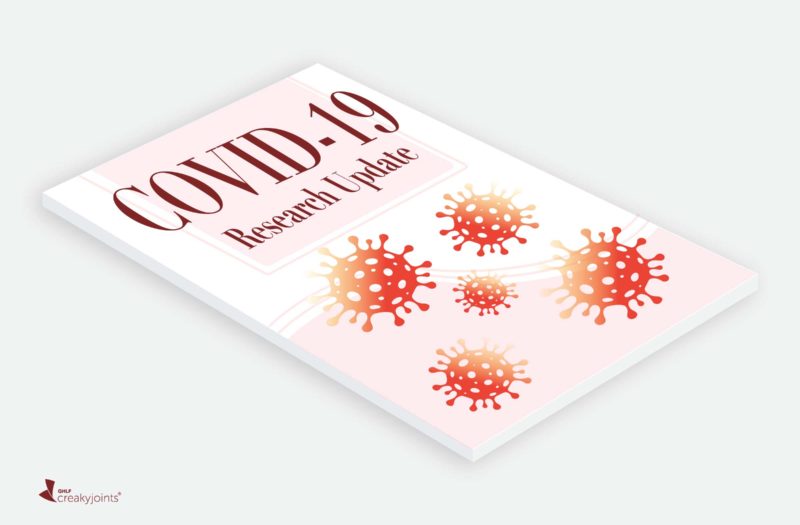Learn more about our FREE COVID-19 Patient Support Program for chronic illness patients and their loved ones.
Over the course of the COVID-19 pandemic, studies have shown conflicting results in terms of whether or not people with rheumatic disease have a higher risk of severe outcomes from COVID-19 than the general population. Although more research is needed to make any definite conclusions, a new study published in the journal The Lancet Rhematology shows some good news: COVID-19 disease outcomes in people with rheumatic and musculoskeletal disease are improving over time.
Researchers identified 8,540 patients with rheumatic and musculoskeletal diseases who were diagnosed with COVID-19 during the six-month study period, including 2,811 in an early cohort (the first 90 days of the pandemic) and 5,729 patients in a later cohort (the second 90 days of the pandemic).
The researchers found that while still substantial, the risks of severe COVID-19 outcomes have improved over time in those who have rheumatic and musculoskeletal disease.
In particular, they found that:
- Risk of hospitalization was 32.4% in the late cohort versus 45.4% in the early cohort
- Risk of intensive care unit admission was 7.9% in the late cohort versus 14.3% in the early cohort
- Risk of mechanical ventilation was 3.6% in late cohort versus 9.1% in early cohort
- Risk of acute kidney injury was 13.8% in late cohort versus 20.7% in early cohort
- Risk of renal replacement therapy was 0.6% in late cohort versus 1.2% in early cohort
- Risk of death was 4.5% in late cohort versus 9.3% in late cohort
Patients in the study had rheumatic conditions including:
- Gout
- Rheumatoid arthritis
- Other connective tissue diseases
- Spondyloarthritis
- Systemic lupus erythematosus
- Systemic vasculitis
The average age of patients was 62 years in the early cohort and 60 years in the late cohort.
When the researchers restricted the analysis only to patients who were hospitalized (and therefore had comparable illness severity), the differences between the early cohort and later cohort were smaller but still present.
“I thought it was important to do this sub-group analysis looking at hospitalized patients, because since testing capacity increased so much in later months of the pandemic, there was probably some amount of increased identification of mild cases that may have been previously undiagnosed in the earlier cohort,” says lead study author April Jorge, MD, a rheumatologist at Massachusetts General Hospital and Instructor in Medicine at Harvard Medical School.
In other words, Dr. Jorge wanted to make sure that the better outcomes in later group weren’t just due to the fact that there were potentially less severely sick people included in the late cohort because of improvements in coronavirus testing.
However, the presence of differences between the two cohorts even among hospitalized patients further indicates that there has been an improvement in COVID-19 outcomes for those with rheumatic disease and musculoskeletal disease over the course of the panemic.
The researchers note that these findings might reflect improvement in treatment and supportive care.
“Those reasons are also probably true for the general population, but in this study, we didn’t specifically address the question of whether outcomes had improved more for rheumatic patients than for the general population,” says Dr. Jorge.
What this means for rheumatic disease patients: Care is improving if you do happen to get sick with COVID-19, but staying cautious and doing all you can to prevent getting sick is still the most important thing you can do. This includes getting the COVID-19 vaccine when it is available to you and recommended for you. After all, while the percentage of patients with severe COVID-19 outcomes decreased in the late cohort, the numbers are still significant.
“My takeaway is that this emphasizes the need for continued vigilance,” says Dr. Jorge. “There have been advances in treatment and supportive care and now the vaccine, which is great, but our patients should be encouraged to have continued vigilance at this time.”
Get Free Coronavirus Support for Chronic Illness Patients
Join the Global Healthy Living Foundation’s free COVID-19 Support Program for chronic illness patients and their families. We will be providing updated information, community support, and other resources tailored specifically to your health and safety. Join now.
Interview with April Jorge, MD, a rheumatologist at Massachusetts General Hospital and Instructor in Medicine at Harvard Medical School
Jorge A, et al. Temporal trends in severe COVID-19 outcomes in patients with rheumatic disease: a cohort study. The Lancet Rheumatology. December 23, 2020. doi: https://doi.org/10.1016/S2665-9913(20)30422-7.






